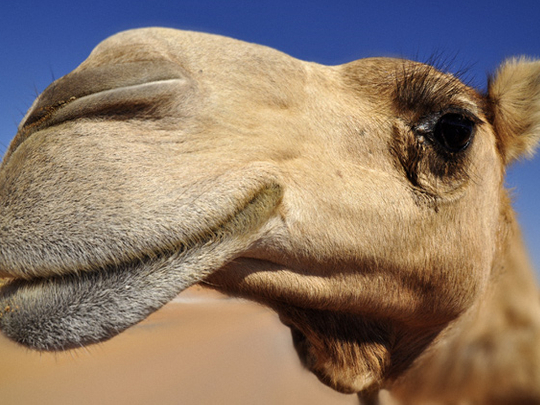
"This photograph was taken in the Al Ain camel market. This camel was very friendly and almost smiled as if he knew the photo will appear in Gulf News," says Faisal Omar Al Jabri. Image Credit: Faisal Omar Al Jabri/Gulf News Reader
Al Ain: Coffee drinkers who like a frothy head on their morning caffeine fix could soon be able to order a "camel-ccino" or cappuccino with camel's milk.
Coffee and camels — two icons of Arab heritage — have been brought together not only to create a hot beverage, but to help the country achieve food security.
The UAE has more than 300,000 camels that produce 40,000 metric tonnes of milk annually but relatively little commercial use has been made of it till now.
Dr Louis Laleye, associate professor at the Department of Food Sciences, College of Food and Agriculture at UAE University in Al Ain, is changing all that by creating an array of camel's milk-based food products to stock supermarkets in the near future.
First in line is camel's milk powder that when mixed with water creates a regular glass of milk. The second is a differently processed camel's milk powder that targets coffee drinkers. Studies reveal that when whipped up, camel's milk creates a very satisfactory froth, a vital element of the cappuccino.
"With basic research we are better understanding the benefits and uses of camel milk," said Laleye who researched cow's milk for 25 years before he arrived in the UAE seven years ago.
The patent for the cappuccino camel's milk powder is still pending but initial consumer surveys conducted at Carrefour in Al Ain earlier this year were very positive.
Tasters reported a creamier taste and more stable foam that lasts to the last drop of coffee.
To make it at home, the powdered cappuccino powder has to be mixed with coffee and water.
Better than cow's milk
"Camel's milk proteins are better for you than cow's milk which can cause some allergies. Not too much work has been done on them but they have components which can help diabetes, cholesterol or obesity," said Laleye.
The research will help the camel milk farmers and the UAE dairy industry to find new applications and new products derived from camel milk, he added
"Exploiting camel milk will help bring food security in the UAE by using raw materials already available in the country, and bring an added income to dairy farmers. We're looking at developing cheese, yoghurt and sports protein powder. Cheese is difficult but not impossible," he added.
The problem with making cheese from camel's milk is finding an enzyme that coagulates the milk. To do this Laleye and his students have turned to nature.
"There are plants that camels instinctively do not eat because it can coagulate their milk. We are researching many desert plants to see if any of these enzymes could be used to make cheese," said Laleye.
Desert's white gold
It has been said that camel's milk is the "white gold" of the desert. The production of camel's milk has been steadily increasing during the last few years and researchers are developing new products to take advantage of the unique characteristics of camel's milk.
Camel's milk is lower in fat and higher in vitamin C compared to cow's milk as well as being rich in unsaturated fatty acids. It can boost the overall immune system, is non-allergenic and has been proven as the closest substitute for mother's milk. Camel's milk is easily digestible as it does not curdle in acidic environment such as the stomach.
Source: www.camelicious.ae













